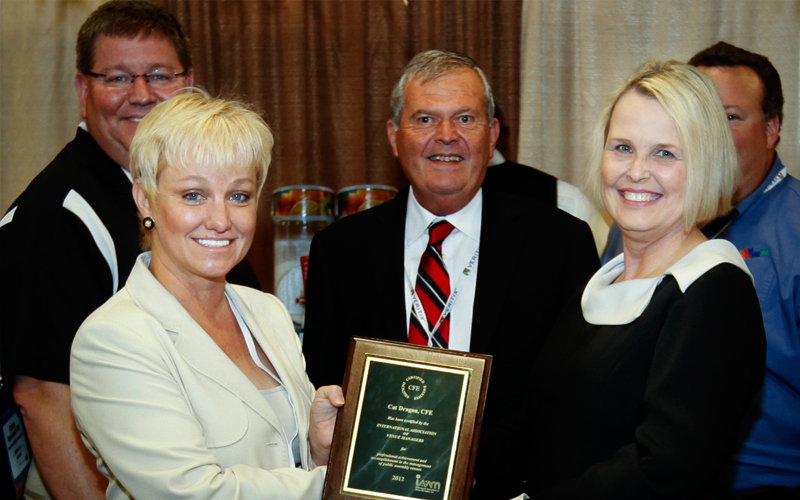Getting Less Than Six Hours of Sleep Results In…
Are you getting enough sleep every night?
The Art of Listening
For individuals in the sales industry, ensuring clients hear what you are saying (selling) is a critical component for success—but the proverbial sales pitch can feel like a 90-mph fastball as you rush through your presentation in the usual limited meeting time.
Yet, the art of selling might be more about the art of listening rather than speaking. Building a loyal customer is like building a relationship. It’s a two-way conversation of hearing what the client needs and providing solutions they can trust and use.
Populous, one of the world leaders in innovative architecture has mastered the art of listening by building a large-scale brainstorming event gathering clients from various sectors. These collaborations, called “Imagine That,” give attendees and the company a more comprehensive understanding of trends shaping their industry, while the meaningful design workshops will certainly be used to impact Populous’ approach to design in the future.
Don’t have the resources to gather clients for a big brainstorming session? Try one of these alternatives:
- At your next client meeting, try to start by engaging in a broader conversation about the goals, trends, and business challenges the client faces in the coming months.
- Can’t fly your team in? Introduce your company’s research experts through a short teleconference or on FaceTime or Google Hangout
- Send a quick note and share relevant research that your team recently published.
- Develop a short online survey clients can take. There are some simple online survey tools you can use to create and gather data.
- Join in on social media sites to post pictures of happy clients, new products, and show customers what your team is up to with photo essays.
- Check out online feedback and message boards. Joining IAVM gives Allied Members access to VenueNet, IAVM’s online community. VenueNet is a great place to get the industry pulse and suggest solutions to questions posted on discussion boards.
Listening can act as a powerful tool to encourage innovation. By listening to your client you may be the first person in your organization to realize it’s time for a change in products.
One of the best events to hear what venue managers are saying about the industry is VenueConnect, IAVM’s annual conference and trade show. This year’s event will be in Portland, Or., July 26-29. The conference brings in venue professionals from around the world and many are the decision makers for their venues.
Make sure your company reserves a trade show booth and signs up to get connected one-on-one with venue buyers through the association’s new hosted buyer program, IAVM DirectConnect, where venue’s tell us what they plan to buy and how much they plan to spend and you set up a series of short meetings during the conference to help them accomplish their buying needs!
Are You Ready for the Holacracy?
Tony Hsieh doesn’t want to be CEO of Zappos anymore. Okay, that’s not quite true. In reality, he doesn’t want the title “CEO.”
In a move that some outlets are already touting as the hot, new management trend of 2014, Hsieh will flatten his organization and implement a Holacracy.
Hola what? Yeah, a Holacracy (it’s capitalized because it’s a brand, folks), which is “a distributed authority system—a set of ‘rules of the game’ that bake empowerment into the core of the organization,” as defined by HolacracyOnce LLC. “Unlike conventional top-down or progressive bottom-up approaches, it integrates the benefits of both without relying on parental heroic leaders. Everyone becomes a leader of their roles and a follower of others’, processing tensions with real authority and real responsibility, through dynamic governance and transparent operations.”
For Zappos, about 10 percent of the company currently operates under a Holacracy. By the end of year, all 1,500 employees will operate under the system.
However, Alison Griswold, a reporter for Business Insider, says it won’t work. She says that the fundamental issue is that people don’t self-regulate or discipline themselves that well. Another reason is attrition.
“Companies bled talent as successful managers jumped ship instead of losing their titles,” she wrote. “At the same time, poor and mediocre managers that the companies hoped to effectively demote continued to be seen as de facto leaders.”
Over on Medium.com, Alexis Bowers with HolacracyOne addresses some of the common myths surrounding the operating system.
“Holacracy specifies how to decide, not what to decide,” Bowers wrote. “There are principles an organization can align with when designing systems like compensation that will align well with Holacracy, but there’s no one prescribed answer.”
And it’s not a cure-all, either.
“It is simply a technology that specifies how an organization can build its bones and structure itself,” Bowers wrote. “It probably doesn’t do all of the magical things that folks think it will do, but it can be pretty transformative. Holacracy will not make unicorns pop out of cupcakes, but if practiced regularly, there is increased transparency, efficiency, and more distribution of power and authority.”
Back up there. It won’t make unicorns pop out of cupcakes? Well, then, maybe it’s not for me. Maybe it’s for you, though. How would you imagine your organization operating under a Holacracy? Please share your thoughts in the comments.
(Image from the HolacracyOne Facebook page)
FM Magazine: Crossword Puzzle Solution
Here are the answers to the crossword puzzle featured in the October/November issue of Facility Manager magazine. As a reminder, any IAVM member that sends in a photo/scan of completed puzzles from the next issue will be entered into a drawing for a complimentary registration to VenueConnect 2014 in Portland, Oregon! (Submissions must be received by the deadline printed with each puzzle.)
Show Your Commitment to the Industry by Earning Your CFE
When you’re a Certified Facilities Executive (CFE), it shows that you’re a skilled manager, that you’re committed to the industry, and that you’ve pledged to continue your professional growth and development. You’re also recognized as an expert in your profession by those inside and outside of the industry.
“I love what I do and obtaining my CFE is not the end, it is only the beginning,” said Cat Dragon, CFE, in our February/March 2013 issue. “It has opened doors for me to provide greater service for the good of the whole.”
It also provided Dragon with something else.
“Credibility…with my colleagues and students, with clients, with potential employers for my students,” she said. “The certification are not given out lightly; they are earned. The certification fosters a stronger spirit of professionalism and shows your commitment to the education value within our field.”
Now’s the time to join that group of your peers who have reached the pinnacle of achievement with IAVM by becoming Certified Facilities Executives. With the holidays and end-of-the-year activities now behind you, accept the challenge to make 2014 the year you earn your CFE.
Applications and written essays are due no later than Feb. 1, 2014. Apply today!
Do you want to receive a Front Row News weekly digest?
Categories
- Allied (856)
- Architecture (147)
- Arenas (744)
- Career (890)
- Convention Centers (889)
- Education (608)
- Events (1,528)
- Food & Beverage (193)
- Foundation (113)
- Guest Experience (1,482)
- Industry News (2,253)
- Leadership (1,872)
- Marketing (150)
- Membership (1,985)
- Music (212)
- Performing Arts Centers (453)
- Professional Development (398)
- Research (127)
- Safety & Security (425)
- Sports (763)
- Stadiums (607)
- Student (159)
- Technology (515)
- Ticketing (92)
- Touring (82)
- Trends (357)
- Uncategorized (771)
- Universities (216)
- Video (25)
- Young Professional (198)
Twitter Feed
- Twitter feed loading
Recent Posts
- GEODIS Park Selects Allied Universal As Its Preferred Event Services Provider
- Venuworks Appoints Marc Solis as Executive Director of the Fresno Convention and Entertainment Center
- Los Angeles Convention Center Diverts 8,000 Pounds of Wood Waste to Local Foundation Supporting Fire Victims
- Fort Worth Unveils Plans for Phase 2 of Convention Center Transformation
- San Diego Convention Center CEO Announces Retirement After a Decade of Leadership
Categories
- Allied
- Architecture
- Arenas
- Career
- Convention Centers
- Education
- Events
- Food & Beverage
- Foundation
- Guest Experience
- Industry News
- Leadership
- Marketing
- Membership
- Music
- Performing Arts Centers
- Professional Development
- Research
- Safety & Security
- Sports
- Stadiums
- Student
- Technology
- Ticketing
- Touring
- Trends
- Uncategorized
- Universities
- Video
- Young Professional
Archives
- February 2026
- January 2026
- December 2025
- November 2025
- October 2025
- September 2025
- August 2025
- July 2025
- June 2025
- May 2025
- April 2025
- March 2025
- February 2025
- January 2025
- December 2024
- November 2024
- October 2024
- September 2024
- August 2024
- July 2024
- June 2024
- May 2024
- April 2024
- March 2024
- February 2024
- January 2024
- December 2023
- November 2023
- October 2023
- September 2023
- August 2023
- July 2023
- June 2023
- May 2023
- April 2023
- March 2023
- February 2023
- January 2023
- December 2022
- November 2022
- October 2022
- September 2022
- August 2022
- July 2022
- June 2022
- May 2022
- April 2022
- March 2022
- February 2022
- January 2022
- December 2021
- November 2021
- October 2021
- September 2021
- August 2021
- July 2021
- June 2021
- May 2021
- April 2021
- March 2021
- February 2021
- January 2021
- December 2020
- November 2020
- October 2020
- September 2020
- August 2020
- July 2020
- June 2020
- May 2020
- April 2020
- March 2020
- February 2020
- January 2020
- December 2019
- November 2019
- October 2019
- September 2019
- August 2019
- July 2019
- June 2019
- May 2019
- April 2019
- March 2019
- February 2019
- January 2019
- December 2018
- November 2018
- October 2018
- September 2018
- August 2018
- July 2018
- June 2018
- May 2018
- April 2018
- March 2018
- February 2018
- January 2018
- December 2017
- November 2017
- October 2017
- September 2017
- August 2017
- July 2017
- June 2017
- May 2017
- April 2017
- March 2017
- February 2017
- January 2017
- December 2016
- November 2016
- October 2016
- September 2016
- August 2016
- July 2016
- June 2016
- May 2016
- April 2016
- March 2016
- February 2016
- January 2016
- December 2015
- November 2015
- October 2015
- September 2015
- August 2015
- July 2015
- June 2015
- May 2015
- April 2015
- March 2015
- February 2015
- January 2015
- December 2014
- November 2014
- October 2014
- September 2014
- August 2014
- July 2014
- June 2014
- May 2014
- April 2014
- March 2014
- February 2014
- January 2014
- December 2013
- November 2013
- October 2013
- September 2013
- August 2013
- July 2013
- June 2013
- May 2013
- April 2013
- March 2013
- February 2013
- January 2013
- May 2012
- March 2012
- December 2011
- November 2011
- October 2011
Recent Comments
- Frank Bradshaw, Ph.D., CVE on John Meyer, CVE, a Tireless Advocate of Certification for Venue Professionals, Has Died
- Neil Sulkes on Hilary Hartung, Friend to Many in Venue Marketing, Has Left Us
- Jason Parker, CVE on The Devastation of Hurricane Helene and How We Can Support One Another
- Larry Perkins on Touhey Testifies Against Speculative Ticketing Before Congressional Subcommittee
- Peter Secord on Major Players for Planned Elkhart Amphitheater Were in the Mix at VenueConnect




